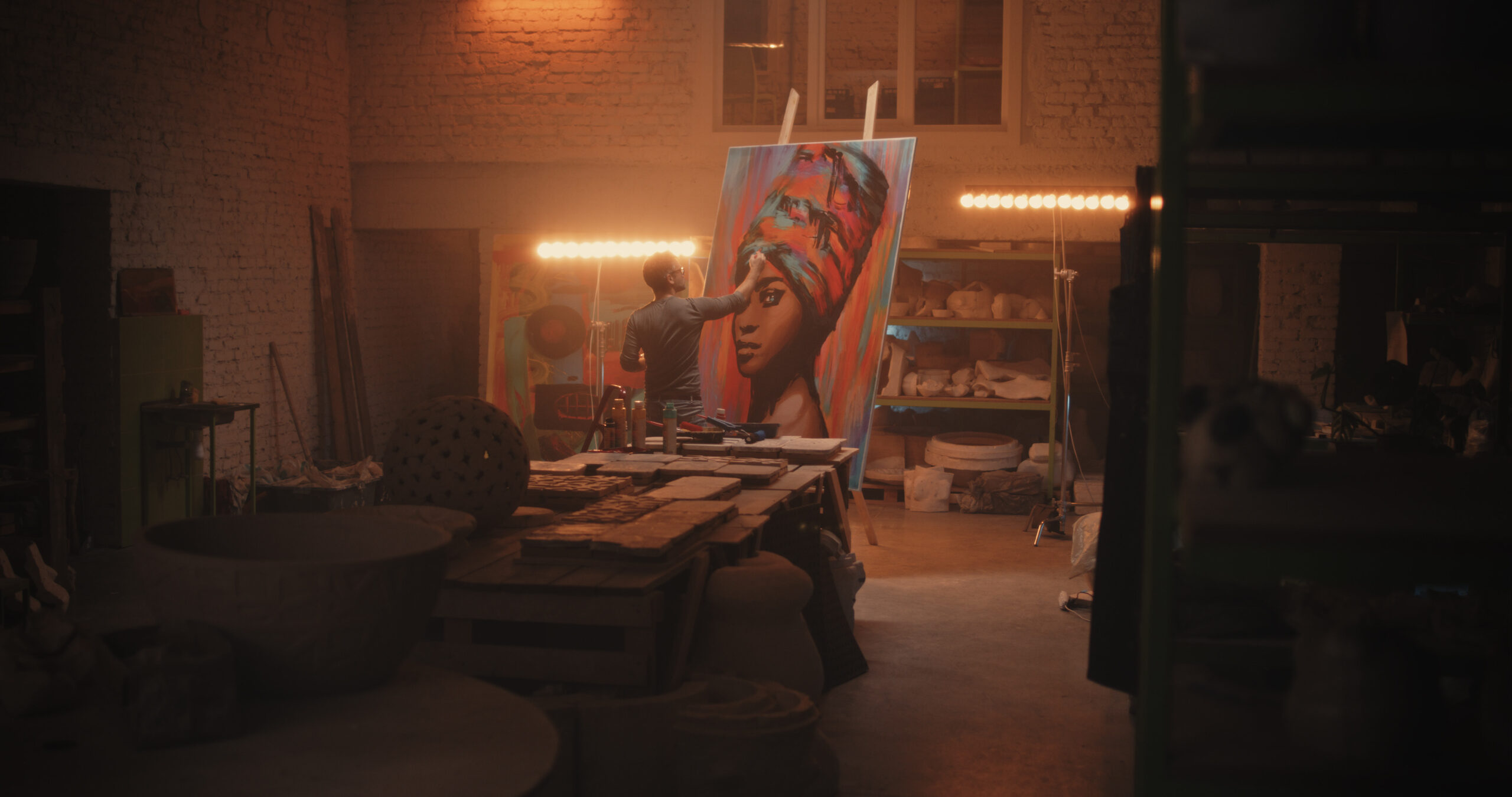
“Magic” Mike Lane can’t stop bumping and grinding. He’s the male stripper version of a bank robber or cowboy who swears he’s retired but gets lured back into action for one last job. “Magic Mike’s Last Dance,” the third film starring Channing Tatum as a big-hearted, iron-thewed Florida stripper, knows that we know that Mike doesn’t feel truly fulfilled unless he’s dancing.
To its credit, Steven Soderbergh’s new movie gets the “I’m done, don’t ask me to dance” part of the ritual out of the way in less than ten minutes. A brief prologue establishes that Mike lost his furniture business during the pandemic and works as a bartender at catered events in Miami. That’s where he meets Max (Salma Hayek), the estranged and wants-to-be-divorced wife of a London one-percenter. Max offers Mike an exorbitant sum for one last dance. After a brief pantomime of refusal, he agrees, and it’s such a mind-blowing experience for Max (the sex afterward is great, too) that she invites him to come with her to London and create and choreograph a stage production that will bring the Magic Mike experience to the West End. You know, the kind of thing that happens all the time.
The rest of the movie is a backstage drama about Mike and Max learning how to be a couple as they collaborate on the show and try to stop it from getting shut down by Max’s husband for violating historic district architectural codes, etc. It’s all just a series of perfunctory roadblocks placed between Max and Mike’s inevitable and well-deserved happy endings as lovers and artistic collaborators.
“Magic Mike’s Last Dance” is a patchwork that takes itself absolutely seriously as entertainment, but wears other ambitions lightly. There are dance numbers, romantic melodrama contrivances, and odd but intriguing 19th-century affectations (Max’s teenage daughter Zadie, played by Jemilia George, narrates Mike’s progress through London’s upper echelons as if reading from a 19th-century Edith Wharton-esque novel). Many scenes place the working-class-hero Mike in situations where he’s clearly out of his depth. Asked about his plans for Act Three, Mike blurts, “Uh, we’re doin’ it!” He’s like a character in one of those 1930s movies where a poor boy attends a fancy dinner at an industrialist’s mansion, gawks at the vaulted ceilings and chandeliers, and hollers, “What a joint!”
As is often the case with Soderbergh, who’s been at the top of the directorial heap for at least 20 years but retains a hustling gig-worker’s point-of-view—“Magic Mike’s Last Dance” is more attentive to details of class difference than many Hollywood movies set in this environment would probably be. Sometimes the film will cut to Max’s butler Victor, played by Ayub Khan Din, when Max and Mike are discussing art, love, and happiness, as if to remind us that very few people get the time to talk about such matters without tedious everyday tasks fragmenting their attention.
Notice, too, how sensitively Tatum conveys Mike’s reactions to his sudden immersion into a new reality where he doesn’t have to struggle just to survive. He seems excited but also wary as if expecting it all to evaporate like his furniture business. Tatum had a modest childhood in the American south and made it in Hollywood without rich or famous parents or preexisting industry connections. He has retained a smidge of “I can’t believe this is happening to me” energy, and he taps into it whenever he plays Mike, perhaps even more so in this one. We understand why Mike would be discombobulated by the opportunities dropped in his lap. But we also understand that he’s the kind of guy who can adjust quickly because he’s spent most of his life catering to these sorts of people, and knows how to give them the fantasies they crave without surrendering too much of his soul.
This film is a pretext for Tatum, Soderbergh, and screenwriter Reid Carolin (who wrote the previous two “Magic Mike” movies) to play around with a great character one more time without repeating themselves. After having previously given us, basically, “Saturday Night Fever With a Stripper, Combined with a Mentor-Whose-Pupil-Goes-Bad Film” (aka “Magic Mike”) and “Female Empowerment Fantasy and Male Bonding Comedy Disguised as a Comedic Road Movie with References To Apocalypse Now and The Odyssey” (aka “Magic Mike XXL”) they’ve made something else entirely: a film about desire, monogamous love, creativity, and freedom, but lightly so, never in a way that makes you roll your eyes. (Well, maybe a couple of times—mainly when characters repeat slogans about economic inequality simplistic enough to fit on a bumper sticker.)
At the same time, this is one of Soderbergh’s more playfully referential entertainments. It’s not as deliberately abrasive and absurd as Soderbergh’s quasi-experimental comedy “Schizopolis” or as voluptuously show-offy as “Oceans 12” (the one in the franchise where Julia Roberts plays both her regular character and “Julia Roberts”). But it’s a movie about moviemaking, the artistic process, and all the various types of cinema and fiction it’s drawing on, as much as it’s about Mike and Max and the dance production. And it’s about the idea, exemplified by so many of Soderbergh’s projects, that a stylish diversion can still have substance. (“This show is not about getting dick,” Max tells their artistic team, then pauses for a nanosecond and adds, “Only.”)
None of it would work if Tatum weren’t every inch the movie star, and probably the last American-born A-list movie actor who can really, truly dance and gets occasional opportunities to prove it. He dances with his leading lady a couple of times here, but most of their tangos are emotional and intellectual, and the movie respects her ferocious energy and focus enough to let her take the spotlight often.
Nobody’s going to write thesis papers about the intricate architecture of this movie’s storytelling. It just goes where it needs to go or feels like going, much like the other two films, though in a different way. It all leads to the big show (another kind of movie-format cliche), and when the curtain finally goes up—revealing a cabaret-ish production that’s essentially the same one Tatum co-created that’s currently a smash in London, complete with audience participation—the movie cleverly finds ways to connect what’s happening onstage to what’s happening within Mike and Max.
Most of all, “Magic Mike’s Last Dance” is about fit, graceful bodies moving through space. Whether the performers are dance-miming sex that would get the film an NC-17 rating if the actors weren’t clothed or performing a sort-of Bob Fosse-meets-”Singin’ in the Rain” routine onstage, or just walking and talking around London while coping with anxieties that will smother happiness if not held in check, Soderbergh and Tatum channel a primordial sense of why people love watching movies. Soderbergh often kids the Marvel films for being sexless, but you can tell by the way he shoots Mike and the other dancers that he knows this series is an R-rated wish-fulfillment fantasy for adults with libidos. Mike appears onstage in a flash of light, offering an instant escape to a universe of aesthetic and sexual bliss, but he never crosses boundaries without getting permission first. When it’s all over, he escorts the patron back to her seat and says thank you.
Now playing in theaters.




